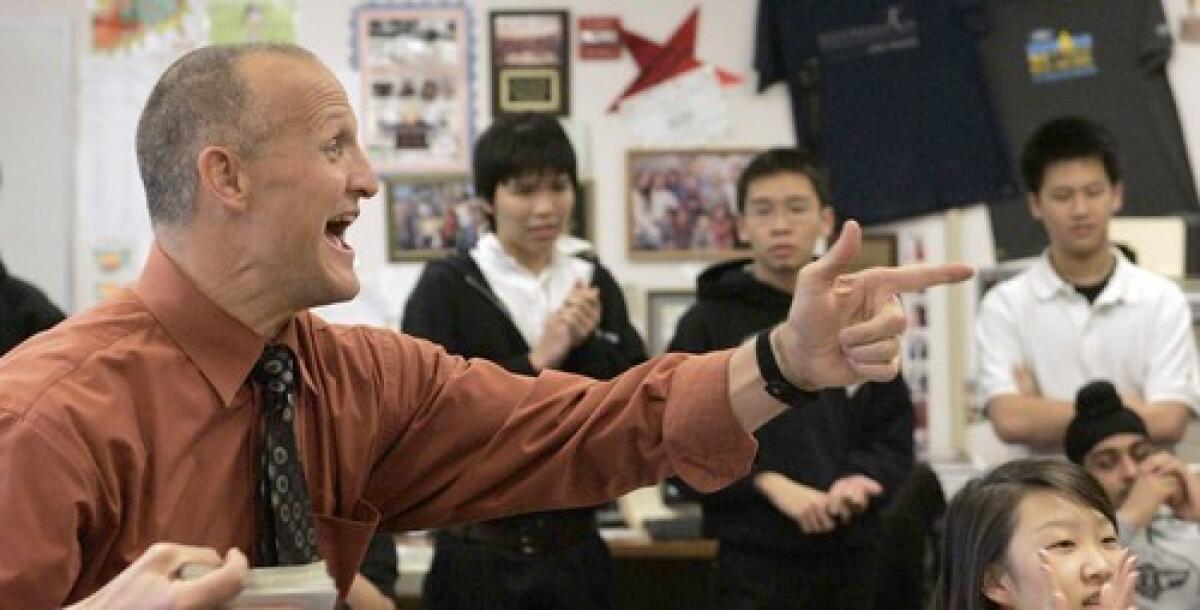Proof of Anaheim math teacher’s skill is in students’ test scores

- Share via
Sam Calavitta presides over what may be the noisiest, most spirited math class in the nation.
He greets each student personally, usually with a nickname (“Butterfly,” “Batgirl” and “Champ” are a few) and a fist bump. Then he launches a raucous, quiz-show-style contest.
Boys and girls line up on opposite sides of the room, Calavitta shouts out complex equations from index cards, and the opposing sides clap and cheer with each correct answer.
“State the anti-derivative of the secant function,” Calavitta yells.
“The natural log of the absolute value secant x plus tangent x plus c,” a student answers correctly.
Next it’s a trigonometry game, with students shifting partners after each question is posed, making a mad dash around tightly squeezed desks to find a new spot.
This is a typical day in Calavitta’s Advanced Placement calculus class. His students at Fairmont Preparatory Academy in Anaheim think he may be the best math teacher on any campus, anywhere. They may be on to something.
Just look at his AP calculus exam scores from last year: All 81 of his students aced the college-level test, earning an average score of 4.79 out of 5. Sixty-nine of the students earned a perfect 5.
On Feb. 19, he was one of 50 teachers from around the country to win the 2009 Siemens Award for Advanced Placement, which recognizes “exemplary teaching and enthusiastic dedication to students and the AP program.” He received a $1,000 prize.
And in 2008, the College Board recognized Fairmont Prep as having one of the strongest AP calculus programs in California.
On a campus with about 560 students in seventh through 12th grades, 30% are enrolled in AP calculus classes. Since Calavitta began teaching AP courses in 1993, his students have had a 96% pass rate on the exam.
On campus, he is called Mr. Cal or simply Cal. His rapport with students, like his energy, comes easily. Think drill sergeant and trusted advisor. He sees himself as a math coach.
Boredom is an enemy. He -- and his students -- are always on the move.
“He challenges you, but he also makes you feel comfortable and makes it understandable,” said Brook Jeang, a 16-year-old junior. “It’s the Cal method. You can’t really duplicate it.”
Calavitta, the father of nine, is a former aerospace engineer who developed his philosophy of teaching from sports, where he competed as a wrestler and is now a triathlete. The drill is the same -- learn new skills, master them through practice, but always circle back to the basics.
“One of the difficulties with the conventional teaching approach is teachers’ feeling their job is to disseminate information from the textbook and have the kids regurgitate it, and then it’s quickly forgotten,” said Calavitta. “The promise I make to my students is that, ‘I will never let you forget.’ ”
Esther Chung, 16, said Cal helped her feel confident in her skills from the start, even though she’d never taken an AP exam. Students can receive college credit if they pass AP tests; Chung got a 5.
“There’s never a day when we’re not having quizzes and competitions,” said Chung. “He prepares you so well that when you actually get to the exam, it feels like just another day in Cal’s class.”
Stephen Yoo, 13, wasn’t about to miss an opportunity to learn from Mr. Cal. He is one of two eighth-graders taking AP calculus this year; 13 is an extremely young age to tackle the subject. Last year, one of Calavitta’s eighth-grade students scored a perfect 5 on the AP exam.
“He’s known as a teacher who can change students, not only in school but out of school,” Stephen said. “I had never been used to putting everything I had into math, because it was relatively easy. But this year I’ve learned about effort, and I really appreciate that.”
Calavitta’s route to the classroom has been somewhat circuitous. He has taught for 19 years but started off as an analyst at an aerospace firm that developed satellite telecommunications systems.
He coached high school wrestling and, in 1999, moved his family to Montana, where he worked as a hand on a 100-year-old ranch. He was a principal at Calvary Chapel Academy in Yorba Linda before being recruited by Fairmont.
He has written calculus textbooks and consults with public school districts and teachers on math instruction.
Calavitta is also an associate professor at Cal State Fullerton under an arrangement that allows students taking any of his classes to receive full college credit.
He tutors students during lunch and holds Saturday sessions that draw up to 60 students every weekend.
And he and his wife, Monica, run a summer wrestling and character-building camp in Montana.
Fairmont, housed in a hacienda-style mansion built in 1929, charges a top tuition of $16,870, and 10% to 12% of students receive financial aid.
Most of his students are not math whizzes, Calavitta said, but they are jazzed about calculus, a branch of mathematics that involves rates of change and is used in science, engineering and economics.
“What they get out of calculus here is a belief that they can do something that they never thought they’d be able to do,” Calavitta said. “My job is not to foster or cater to brilliance but to nurture perseverance.”
Before taking Calavitta’s class in 2004, former student Stephen Whitlock hated math. But he ended up with a 5 on the AP exam and is senior at Orange’s Chapman University majoring in math and planning to teach.
“I had always wanted to teach, but I never knew what [subject] until I took his class,” said Whitlock, who is Calavitta’s classroom assistant. “It takes hard work and meticulous planning on his part. I see that now that I’m working for him.”
Whitlock is one of a group of former Calavitta students on the path to math degrees and teaching careers, said Fairmont Chief Executive Robertson Chandler.
“If you think back to the past, everyone has a teacher who had an impact, someone they remember for years,” he said. “It’s about the math, but it’s also about developing character and discipline and having a commitment to them doing well.”
Fairmont offers an advanced math program in which students can earn up to 22 units of college credit. Next fall, it will launch an Engineering and Applied Sciences Magnet Program, co-founded by Calavitta and colleague Joe Dossen.
Calavitta’s ability to spark interest in math is unusual, said Hank Kepner, president of the National Council of Teachers of Mathematics, who added that the number of math majors in colleges is flat.
“Kids have so many competing things they can get interested in, both in and out of school, and there are so many other disciplines calling them,” said Kepner, a professor at the University of Wisconsin-Milwaukee. “Selling that passion and excitement for a subject is something that students need to hear and see.”
Teaching runs in Calavitta’s blood -- his mother, father and grandfather were in the profession -- and he’s frustrated by people who blame instructors for the shortcomings of public education. He has taught in public schools with 55 kids in class and understands the stress and frustration.
He feels a kinship with another storied Southern California math teacher, Jaime Escalante, whose success teaching AP calculus to minority students at East Los Angeles’ Garfield High School won national plaudits and inspired the film “Stand and Deliver.”
Both teachers subscribe to the theory that learning should be fun. Calavitta has met several of Escalante’s former students at professional seminars.
“I feel what Escalante himself saw is that academics are secondary,” Calavitta said.
“If you want to make a difference in a kid’s life, you have to first of all let them know that they make a difference in your life.”
More to Read
Sign up for Essential California
The most important California stories and recommendations in your inbox every morning.
You may occasionally receive promotional content from the Los Angeles Times.











